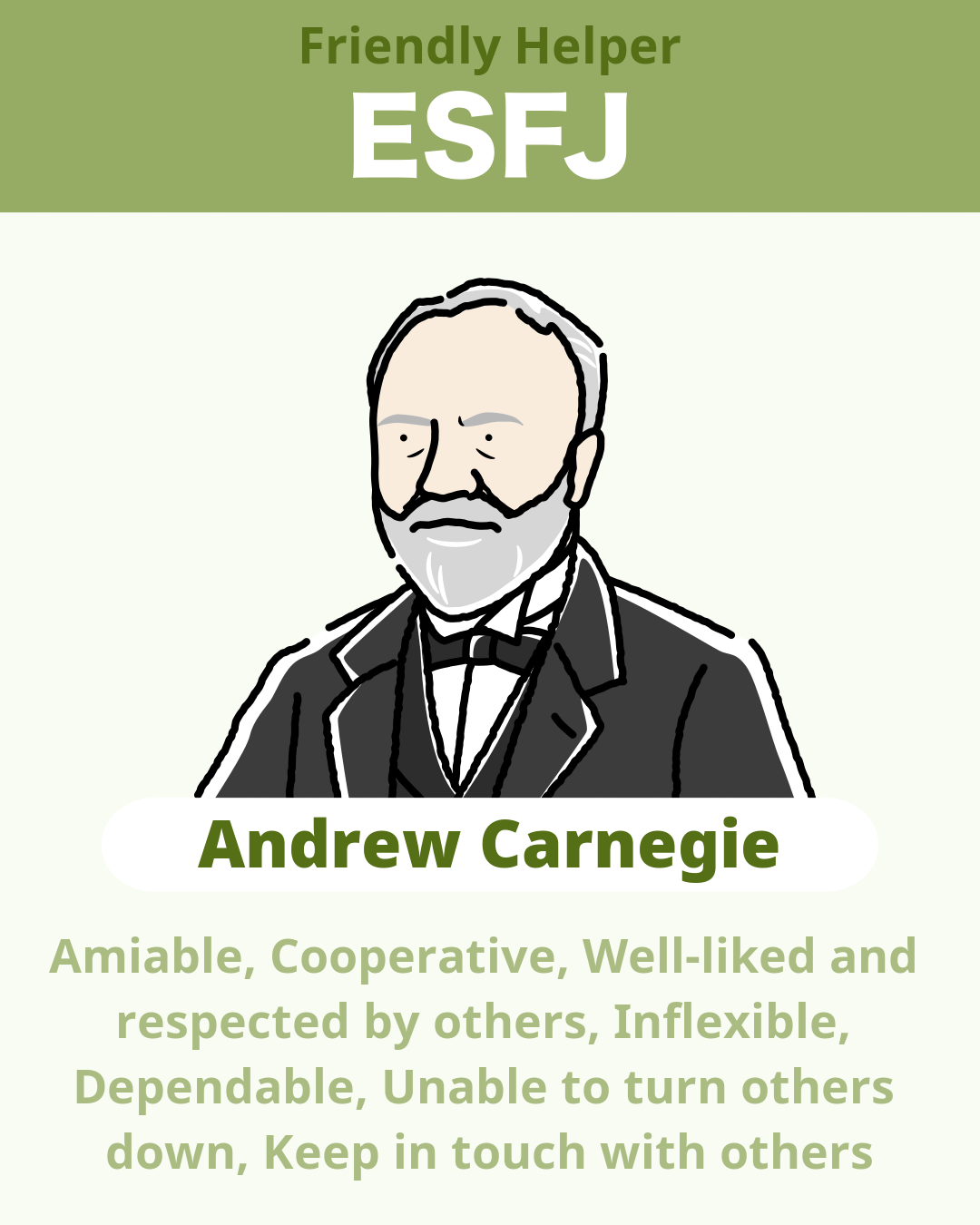
People who have the ESFJ personality type, also known as the Consul personality type, are cooperative and kind to everyone around them. They are compassionate and are quick to lend a helping hand to anyone in need. Because of this, ESFJs are trusted and admired by everyone around them. They are good at reading the room, and having an ESFJ in a group helps to calm the mood. ESFJs can lift the moods of others, and they make others feel at ease just by being around them. On the other hand, they have a delicate side and can fret over casual comments made by others. They are sensitive to the opinions of those around them and may end up taking on things they actually do not want to. They are often forced into doing things they do not want to do, and they can easily become stressed as a result.





| Ranks | Types | % | |
|---|---|---|---|
| 1 | INFP | Vincent van Gogh | 13% |
| 2 | ENFP | Anne Frank | 11% |
| 3 | ISFP | Mozart | 8% |
| 4 | INTP | Albert Einstein | 8% |
| 5 | INFJ | Nightingale | 8% |
| 6 | ESFJ | Andrew Carnegie★ | 7% |
| 7 | ISFJ | Mother Teresa | 7% |
| 8 | ESFP | Marie Antoinette | 6% |
| 9 | ENTP | Thomas Edison | 6% |
| 10 | ENFJ | Joan of Arc | 5% |
| 11 | ISTJ | Sigmund Freud | 4% |
| 12 | ISTP | Spartacus | 4% |
| 13 | INTJ | Leonardo da Vinci | 4% |
| 14 | ESTJ | George Washington | 3% |
| 15 | ESTP | Columbus | 3% |
| 16 | ENTJ | Napoleon | 3% |
Personality types can tell us a lot about how people think, what they want, and how they act. They can also help us find out important things about ourselves. Knowing your personality type can help you make important decisions in life, like choosing a job that fits your strengths or figuring out where you're weak in your relationships with others.
The ESFJ is known as "The Caregiver" because they are helpful, caring, and good at organizing things. They are friendly and outgoing, making people handle themselves as if they belong and are part of a group. Let's look at the strengths and weaknesses of ESFJ in more depth.
The letter "ESFJ" used to be part of the Myers-Briggs Type Indicator (MBTI) personality system, but now these acronyms are used in several different personality type systems. All of these theories of personality are based on the idea that people have preferred ways of learning and expressing themselves and preferred ways of acting in the world.
We don't have to use our preferred modes and can act differently depending on the situation. However, our strongest modes are our preferred ones, usually showing how others see us. Each letter in the acronym endure for a different thought or action, and the letters can be put together in 16 different ways. Let's take a look at ESFJ in particular.
The "E" in ESFJ stands for "extroversion," which shows where you prefer to focus your attention and energy. An outgoing person likes to be involved and has fun when many people are around.
They like to talk to others about their problems and ideas and work best in teams and groups. They like to take action and make things happen but don't always think things through before they act.
The "S" in ESFJ stands for "sensing," which shows how you like to learn and understand things. A sensing person learns and remembers information best when it is real and can be felt, seen, smelled, tasted, or heard in the present moment. Often, they learn by doing and remember specific details of what they did.
The F in ESFJ stands for feeling, which shows how you like to make decisions. Emotions guide a person with the feelings, points of view, values, and goals of everyone involved in a situation. This kind of person likes to make decisions that help everyone get along and work together. ESFJs are genuinely happy when others are successful and happy and want everyone to do their best.
In different situations, they may act in very different ways, depending on the people and opinions involved and what they think is best for all involved at that time. They usually care about other people's feelings and talk to them warmly, politely, or diplomatically.
The "J" in ESFJ stands for "judge," which shows how you like to act and be seen by others. A person who judges is organized and systematic, and their life is controlled and in order. They make to-do lists as well as schedules and stick to them.
They are better at making plans and choices and usually work before playing. This group of traits describes the ESFJ, the Caregiver, as a whole. The ESFJ is very aware of the people around them, creating a sense of harmony and cooperation and putting the happiness of friends and family at the top of their priorities.
They are kind, generous, and very loyal to the people, traditions, habits, and customs they have. They are well-organized and reliable, so you can always count on them.
In America, 9 and 13% of the population have the ESFJ personality type. This personality type is extremely common in women, with 12-17% of women having it. Some of our favorite female celebrities, like Julia Roberts, Taylor Swift, and Viola Davis, are all ESFJs.
The best things about an ESFJ personality are:
ESFJs are friendly, outgoing, and willing to give and share any needed help. Also, they are good at communicating with compassion, making strong emotional bonds, and caring deeply about the well-being of the people they care about.
The ESFJ loves the individuals around them, so wherever they go, they make warm and friendly connections with people. So, they help people get along and work together, which is good for teamwork and making friends.
An ESFJ is very loyal to the people, traditions, and values that are important to them. They do what they say they will and follow customs and traditions.
The ESFJ personality type is organized and systematic, and their loyalty makes them reliable. They know how to use efficient methods, stick to schedules, and keep their promises.
An ESFJ is very practical, which helps them live up to their values and goals, get everything done on their to-do list, and go above and beyond what awaits them. They make good plans that let them do their best in every situation.
An ESFJ will go out of its way to assist and promote the people and projects that are important to them. People are genuinely happy for the success and happiness of others, making everyone want to do their best.
Listed are the most important weaknesses of an ESFJ personality:
The ESFJ must always be noticed, liked, supported, and talked to by others. Their feeling of worth often depends on how others see and treat them, and they react very badly when they feel ignored or get bad feedback. On the other hand, they want to be seen as helpful, friendly, trustable, and good, and they may need to draw attention to their actions once they don't get enough credit.
The ESFJ resists change because they believe in laws, traditions, systems, and hierarchies. But depending on old habits and systems can make them less creative and less willing to find new ways to solve problems.
An ESFJ's powerful values and principles can make them critical of others and quickly form bad opinions of them.
Often, an ESFJ sees the world in clear, black-and-white ways, like good or bad, right or wrong, etc. They aren't particularly flexible or open-minded, so their organization and continuity can come across as controlling. They expect others to follow their set values, processes, and customs.
The Caretaker personality uses their great organizational skills to help others meet their needs and give them structure. They are great at planning, staying organized, and paying attention to detail. An ESFJ believes in laws, traditions, systems, and hierarchies and can resist change.
They are driven by working as a team and having the same values. They require mutual support, recognition, and harmony to be happy at work. They do best in an environment with clear rules, goals, and results.
There are a lot of jobs where ESFJs can do well and make important contributions to the world, so they have a lot of choices for where to work. In general, they try to avoid jobs like coding or engineering that require them to think alone for long periods. There are many great jobs for ESFJs, such as:
ESFJs are loving, kind, responsible, and helpful, so they must work on their weaknesses.
An ESFJ is a great addition to a team because they are very reliable and take their responsibilities very seriously. An ESFJ is usually willing to put in their way to help a coworker solve a problem, whether it's at work or in their personal lives. Because of this, an ESFJ often makes strong connections at work, which helps them serve their team better.
Using empathy, they think about how their decisions and actions affect others. They do this because they know how important it is to help a team member in need if they want to help the team as a whole. Because this personality type is charismatic and encouraging, it can lead other people well.
An ESFJ has good empathy for others and uses it to ensure that every staff member feels included and cared for. Most of the time, an ESFJ will put the needs of their subordinates ahead of their own. This is why they are often called "servant leaders." When faced with a problem, an ESFJ will usually look for ways to help someone else first.
People can easily take advantage of an ESFJ or make them feel bad when they don't get the help they need, which can hurt their relationships and happiness. ESFJs should think about putting their energy into two areas:
The ESFJ's natural need for affection, support, and recognition can make them seem needy or, in some cases, manipulative. Even though it's important to have friends and family, we can count on most ESFJs to work on becoming emotionally independent from other people. Emotional independence helps people see their worth and set healthy limits, which is especially important for people who are natural caretakers.
An ESFJ will always choose structure and order over chaos. Still, they could benefit from being more open-minded, accepting that things aren't perfect, and not making snap decisions.
In many situations, it can be helpful just to take a few minutes to meditate or practice mindfulness, where you put aside good and bad ideas and important and unimportant things and only let items be for a while.
The amazing ESFJ deserves all the happiness and love in the world. But if they pay attention to some of their less-used mental functions, they can get a better mental balance to help them live a fuller, richer, happier life.
People with the ESFJ personality type are all around us every day. They remember our birthdays, bring us casseroles, remind us of our appointments, and keep society running. But the Caregivers can always do more to love themselves and get all the love they deserve.
If you don't understand your personality type, you can learn more about yourself by taking one of the best online personality tests. If you want to learn more about ESFJs and other personality types, we've compiled a helpful guide for newcomers. Recognizing your personality type and the types of people around you helps you communicate, work together, and build stronger daily relationships.